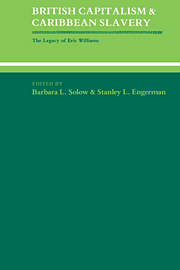Book contents
- Frontmatter
- Contents
- List of Contributors
- Preface
- British Capitalism and Caribbean Slavery: The Legacy of Eric Williams: An Introduction
- Part I Slavery as an Economic Phenomenon
- Part II Caribbean Slavery and the Industrial Revolution
- Part III The Decline of the British West Indies
- Part IV The Basis of Abolition and Emancipation
- Part V Capitalism and Slavery in Historical Perspective
- Capitalism and Slavery on the Islands: A Lesson from the Mainland
- “The Williams Effect”: Eric Williams's Capitalism and Slavery and the Growth of West Indian Political Economy
Eric Williams and Capitalism and Slavery: A Biographical and Historiographical Essay
Published online by Cambridge University Press: 15 December 2009
- Frontmatter
- Contents
- List of Contributors
- Preface
- British Capitalism and Caribbean Slavery: The Legacy of Eric Williams: An Introduction
- Part I Slavery as an Economic Phenomenon
- Part II Caribbean Slavery and the Industrial Revolution
- Part III The Decline of the British West Indies
- Part IV The Basis of Abolition and Emancipation
- Part V Capitalism and Slavery in Historical Perspective
- Capitalism and Slavery on the Islands: A Lesson from the Mainland
- “The Williams Effect”: Eric Williams's Capitalism and Slavery and the Growth of West Indian Political Economy
Summary
We are met here to honor the achievements of the late Dr. Eric Williams and to discuss current research on outstanding issues in British West Indian history. In recent months I have reread much of Capitalism and Slavery, together with Williams's other books and articles, critiques of his work, and especially his autobiography, Inward Hunger: The Education of a Prime Minister. In this essay I will attempt to present a biographical and historiographical study of Williams, including a sketch of the man and his time and how he was influenced by different schools of historiography. I plan to look at his sources, methods, and findings, and, in greater detail, to show how his work has been assessed by historians and others. In short, I intend to show how various conditioning circumstances helped to mold the historical mind and work of Eric Williams, and how scholars in both the First and Third Worlds have reacted to Capitalism and Slavery. More attention will be given to the reactions of British scholars than their counterparts in the West Indies, Africa, and the United States.
Eric Eustace Williams was born in Port-of-Spain, Trinidad, September 25, 1911, the oldest of twelve children of Thomas Henry Williams, a clerk in the Port-of-Spain post office, and Eliza (Boissiere) Williams. He was a precocious child, taking to his studies with exceptional talent and determination under the encouragement and guidance of his father, but not to the exclusion of active participation in sports and part-time help with his mother's bakery business. He was educated in Port-of-Spain at Tranquillity Intermediate School and Queen's Royal College, where he held a government scholarship, graduated with honors, and won the Island Scholarship in 1931.
- Type
- Chapter
- Information
- British Capitalism and Caribbean SlaveryThe Legacy of Eric Williams, pp. 317 - 346Publisher: Cambridge University PressPrint publication year: 1988
- 1
- Cited by

